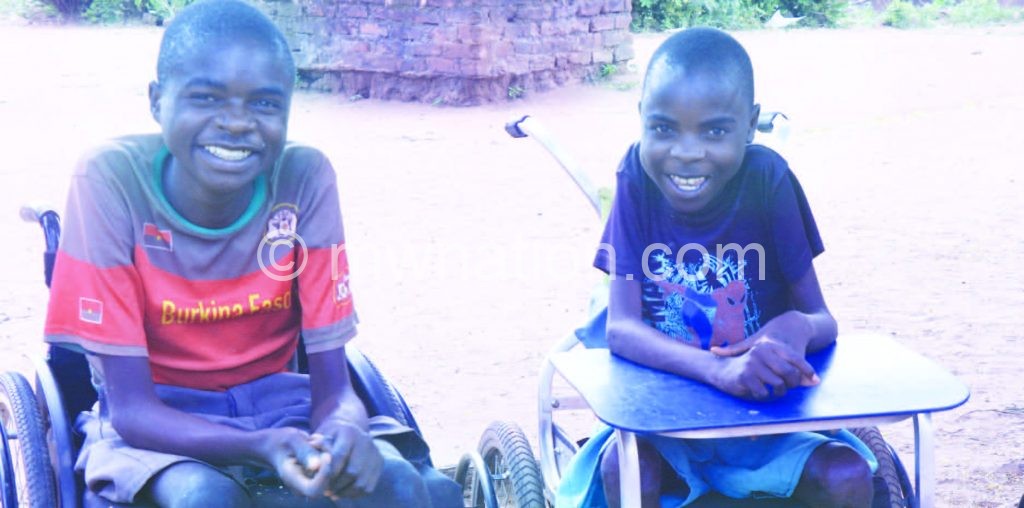Providing education for all
Most of his age mates who reside in the townships are in junior secondary school while those in rural areas are in Standard Six or Seven.
But 14-year-old Jolatani Petulo is in Standard Two at Kanongola Primary School in Traditional Authority (T/A) Mwanza in Salima

This is because he enrolled for Standard One just last year.
Jolatani was born in 2005 with spina bifida, a birth defect that occurs when the spine and spinal cord do not form properly.
This disability confined him to his mother’s house.
“Even for Jolatani to go to the toilet, I had to carry him,” recalls his mother, Mayideni Bauleni.
In 2008, the 40-year-old mother gave birth to her last-born son, Yakweniya, who was also born with a similar defect.
The boys’ father Adam Petulo says his sons’ condition affected the family as it meant being around all the time.
“I stopped going out to do piecework. This affected our income and worsened poverty,” he recounts.
Due to the long distance to school that compels even children without disability to drop out, Petulo and his wife couldn’t afford to send the two boys to school.
The family also had no bicycle or a wheelbarrow to use as a mode of transportation. Jolatani and Yakweniya were constrained to stay home.
Ray of hope
However, following a project which Civil Society Education Coalition (Csec) is implementing in 16 schools in Salima, the two were enrolled at Kanongola Primary School last year and they are both in Standard Two.
Bankrolled by IM Swedish Development Partner, Csec provided the boys with learning materials and wheelchairs for easy mobility to school.
Jolatani and Yakweniya are among 272 learners with disabilities who have benefited from the Csec project which seeks to enhance quality education and retention of girls and learners with disabilities in schools under Kanongola Zone.
Their mother says the development has changed their life for the better as it was painful to see their agemates going to school while they stayed home.
“I am overwhelmed with joy every morning when I see them off to school with their friends. This means they can achieve their dreams of becoming a teacher and a medical doctor,” says Bauleni.
On the other hand, their father says he is now able to fend for the family through a bamboo business and other pieceworks.
Csec programme manager Kisa Kumwenda says the organisation strives to promote inclusive and access to quality education for all to fight poverty.
“We believe children should enjoy basic rights without discrimination; hence, supporting inclusive education because those with disabilities face many barriers. Every activity is community-led for sustainability,” he says.
Kumwenda says the initiative does not just increase enrolment, but also support schools and teachers with the capacity to meet learners’ education needs.
Salima District Education Office special needs coordinator Osward Siwinda says the initiative is supporting the district’s successful implementation of inclusive education policy as it has boosted efforts to have all children access to quality education.
He says: “Parents have realised the importance of educating children with disabilities. We have been empowered to conduct identification of learners with disabilities for teachers to discharge duties effectively.”
Girls not left behind
As learners with disabilities such as Jolatani and Yakweniya are now able to access education, at Chinkhuli Primary School in the same Kanongola Zone, there was no female learner who sat for the 2018 Primary School Leaving Certificate of Education examinations.
The development was attributed to a high dropout rate of girls due to rampant early pregnancies and child marriages, a situation which prompted Csec to enhance the capacity of community-led structures on their roles and responsibilities to increase school completion rate of girls in the zone.
The structures include school management committees, parent-teacher associations, community policing committees and mother groups.
Ndonda Primary School Mother Group chairperson Dorica Samson says they implement measures that promote girls’ education such as providing them with reusable sanitary pads for them not to miss classes during menses.
Although the seven-month closure of schools to halt the spread of Covid-19 has resulted in increased cases of early pregnancies and child marriages across the country, Kumwenda is pleased with the mother groups’ vigilance that increased girls’ retention in the area when schools were reopened in October.
“While such cases were recorded in high numbers in other areas, Kanongola Zone had 12 cases only. The mothers kept monitoring the girls and terminated child marriages. Even those with pregnancies are lured to come back to school after delivery,” he says.
T/A Mwanza says the project has empowered her to leave no stone unturned in curbing vices that hinder girls’ right to education.
“I have banned all harmful cultural practices to promote a liberated environment for children to thrive in order for my area to become sustainably developed. I know there is support for all children to be in school,” she says.
The chief, who is also the global ambassador for girls’ education, adds that she developed child protection by-laws for communities to cherish girls as children to be in school, not brides.
However, she calls upon education stakeholders to address barriers that affect a boy-child to access education, saying the exclusion is a recipe for disaster.
IM Swedish Development Partner country director Steve Tahuna says the strides registered so far are important in creating a Malawi free from poverty and exclusion.
“All individuals have rights to participate and be given opportunities to be an equal member of society. Children with disabilities should exercise and enjoy their right to education, including girls.
“We are delighted with Csec’s involvement of community structures to end child marriages and promote best practices of raising children,” he says.





